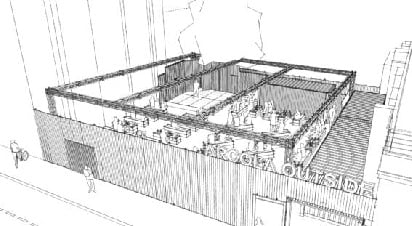
An artist's impression of Arcola Outside
Photo: Arcola Theatre
Covid transmission study to redefine ‘outdoor’ theatre
Imperial College researchers will estimate the probability of infection at two theatres and consider whether a covered venue can "behave" as an outdoor space.
A study into the likelihood of Covid-19 transmission in theatres may help redefine 'outdoor' entertainment.
Imperial College researchers will use scenario based modelling to estimate the probability of infection at Arcola Theatre, London, and Arcola Outside, a 70-seat big top venue due to open in nearby Dalston Curve Garden in spring.
Arcola's Executive Director Ben Todd said they are trying to determine whether an indoor venue could "behave" as an outdoor space, presenting as low a risk of infection as an open-air outdoor theatre.
"How big does the gap have to be between the walls to be [considered] outside? Would that gap need to be two inches, two feet? Instictively I think it's about a foot.
READ MORE:
- 'No evidence' of Covid transmission in ventilated, socially distanced spaces
- Many venues could be made safe for capacity audiences, SAGE says
"Whatever the answer is we try to make it realisable and possible."
Prime Minister Boris Johnson announced on Monday that venues may be able to reopen at a lower capacity as soon as May 17. Outdoor events would have a higher capacity than indoor ones at 4,000 attendees or 50% capacity, whichever is lower.
Todd said the study will also help to determine when the main Arcola theatre can reopen safely.
"What we're looking to define is what parameters we can control, what levers we can pull."
Risk management
Arcola plans to share its findings with the sector and the public so they can decide for themselves whether to reopen or visit venues.
The goal of the research is not to discover a perfect 'Covid safe' model but rather to provide a more accurate way to assess and manage the risk of transmission.
"The general public has a poor understanding of risk management," Todd said.
"When you cross the road the reason that it's 30[mph] not 40 as the speed limit is that you're less likely to die if you get hit.
"If you put 200 people in a theatre and close the doors for a couple of hours how many of them will die?"
Todd said this "sounds grim because we're not used to talking about that in the arts", but said the sector must become more accustomed to making the sorts of life-or-death calculations common in transport, for example.
"There isn't Covid and Covid secure. Covid secure is you on a desert island alone; anything that involves human interaction isn't Covid secure."
For his part, Todd is taking a cautious approach: "If we can't get to a place where our staff, our board, myself are comfortable, we won't open."
Applied research
The Imperial College researchers say they will consider the "most up-to-date case studies" into Covid-19 transmission and industry standards on ventilation.
"This approach will allow [us] to guide on the best ventilation mode to be used: either fully mechanical, fully natural or in mixed-mode; and behavioral change to be put in place in order to keep the performers, the audience and the staff in an environment as safe as possible."
Todd said there has been a lot of recent research on airborne transmission in various spaces: "A formula does exist; the World Health Organisation has developed a bunch of spreadsheets."
"What we're saying is let's take the fundamental research, the more applied research for students in a lecture theatre, workers in an office.
"Let's apply that to a theatre, communicate that, and use theatre as a platform to help people understand transmission."
Join the Discussion
You must be logged in to post a comment.